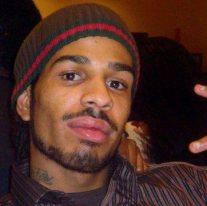 Douglas McAuthur McCain, and American Islamic State (IS) fighter, was reportedly killed by the Free Syrian Army on August 25, 2014. He is the first reported American killed in the line of fire with IS (also known as ISIS, or ISIL), not just fighting with rebels against Syrian dictator Bashaar al-Assad. According to a report in the NYT, it seems that Mr. McCain lost his way as a young man and turned strong religious beliefs and convictions to give himself purpose and stability.
Douglas McAuthur McCain, and American Islamic State (IS) fighter, was reportedly killed by the Free Syrian Army on August 25, 2014. He is the first reported American killed in the line of fire with IS (also known as ISIS, or ISIL), not just fighting with rebels against Syrian dictator Bashaar al-Assad. According to a report in the NYT, it seems that Mr. McCain lost his way as a young man and turned strong religious beliefs and convictions to give himself purpose and stability.
On the SITE (or SITE Intelligence Group) blog, a group that tracks radical Islamic websites and other traffic, I found an article on Mr. McCain’s Twitter activity over the last few years. It quoted tweets and included some screenshots of them from December 2010 – January 2013. It had some observations I found interesting. Two quotes pertain here. Namely:
Notably, though, activity on his Twitter account spanning from December 2012 to January 2013 indicates his radicalization likely happened much later in his life.
And:
When exactly McCain left for Syria to fight with IS was never indicated on his Twitter. However, the year-and-a-half-long gap between his casual tweets in January 2013 and his returning May 14, 2014 tweet—in which he endorses IS and claims that “we will soon be 1″—may indicate a span of time in which McCain became radicalized and immigrated to Syria.
What is “radicalization”?
Wikipedia’s entry on “radicalization” is a good place to start in it’s completeness and depth:
Radicalization (or radicalisation) is a process by which an individual or group comes to adopt increasingly extreme political, social, or religious ideals and aspirations that (1) reject or undermine the status quo[1] or (2) reject and/or undermine contemporary ideas and expressions of freedom of choice. For example, radicalism can originate from a broad social consensus against progressive changes in society. Radicalization can be both violent and nonviolent, although most academic literature focuses on radicalization into violent extremism (RVE).[2] There are multiple pathways that constitute the process of radicalization, which can be independent but are usually mutually reinforcing.[3][4]
I may have been radicalized in most people’s eyes. I became interested in Marx in my undergrad years, reading websites and books while taking sociology classes, all the whilst thinking a utopian world could be won by the proletariat. I’m not saying that it will never happen, but as my academic journey continued into grad school, I became, as am now, a Democratic Socialist.
Now Democratic Socialists are considered of the far/radical left while Mr. McCain subscribed to a perverted form of Islam with violence as morals, value, and custom. Rather, I believe that substantial social/economic change should be accomplished through democratic measures. Are we the same? No.
Keep this all in mind when contemplating issues of “radicalization” and before putting a negative tinge to it.
//
I
 Wikipedia: The letter I is a vowel and used in most words. →
Wikipedia: The letter I is a vowel and used in most words. →

